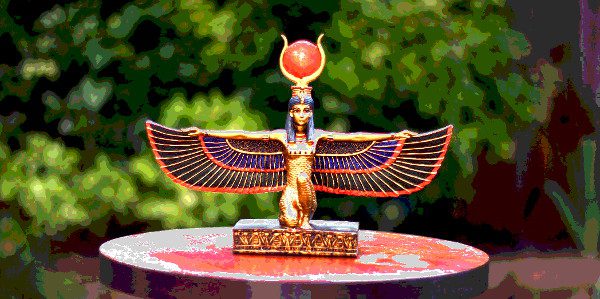“You can’t practice witchcraft while you look down your nose at it” – Aunt Jet, Practical Magic
On a warm night in June, a dozen or so Pagans gathered in a back yard in Denton, Texas to pay honor to Ma’at, Auset, and Nuit. We cast a circle and made offerings to the land spirits and ancestors. We invoked the Deities of the Occasion with prayers and offerings. We listened for Their response… and They answered.
In that group were several people who are devotional polytheists, who see the Gods as real, distinct, individual beings. One believes all Gods are one God. A couple are relatively new to Paganism and are still trying to figure out what they think. And one doesn’t talk about the Gods very much – I don’t know what they think.
But for that evening, none of that mattered. We gathered, we honored the Gods, and we received Their blessings. The devotions and the blessings were real – the magic worked.
Distinctions matter – all these different ways of thinking about the Gods aren’t equally true or even equally helpful. But the distinctions aren’t the only things that matter, and they matter less in some situations than in others. This is what we mean when we say “orthopraxy not orthodoxy” – doing the right thing is more important than believing the right thing.
 Patheos Pagan chief gadfly John Halstead has posted his entry in the “Why I Am Still a Pagan” series with an essay that emphasizes his disbelief in Gods, spirits, and magic. Promoting that disbelief is very important to him:
Patheos Pagan chief gadfly John Halstead has posted his entry in the “Why I Am Still a Pagan” series with an essay that emphasizes his disbelief in Gods, spirits, and magic. Promoting that disbelief is very important to him:
Those who read this blog on a regular basis will know that I don’t have any qualms about telling people I think they are wrong to believe as they do. While I’m not going to deny that anyone had an experience, I am entirely comfortable with criticizing other people’s interpretations of their experiences.
Now, certainly, John (the other John) is entitled to believe what he thinks is true. And he’s entitled to advocate for his beliefs. Freedom of religion and freedom of speech aren’t just the law of the land, they’re good and virtuous ideas. Except for content that is obscene or libelous, neither Pagan Channel editor Jason Mankey nor Patheos management edit blog posts, and that’s another good thing.
But is that loud and vociferous atheism actually helpful?
John says he is still a Pagan because he believes “Paganism has the potential to re-enchant the world.” Like much of his work, this section of his post is brilliant. He describes how modern society’s over-reliance on the scientific process has led to “individual neurosis, social alienation, and environmental degradation.” He rightly rants against “positivistic science and consumer capitalism” and says “Paganism holds out the promise of restoring our awareness of a dimension of reality that eludes the grasp of the scientist and the salesman.” John clearly understands the need to re-enchant the world, and some part of him wants to re-enchant it, or he’d be writing for the Atheist channel.
But you can’t practice Paganism while you look down your nose at it.
John attempts to bridge the gap between atheism and re-enchantment with the work of Ken Wilber and his “pre/trans fallacy.” Basically, this says that interpreting our religious experiences theistically is pre-rational (i.e. – primitive and unsophisticated) while interpreting them nontheistically is trans-rational (i.e. – enlightened and spiritual). One problem with this approach, as John describes, is that “the pre-rational and the trans-rational sometimes look a lot alike.”
The other problem is that it’s ethnocentric bullshit, reeking of colonizers and missionaries severing conquered peoples from their Gods and ancestors for fun and profit.
John admits he doesn’t know how to re-enchant the world while remaining staunchly non-theistic. I would argue that’s because it’s not possible. Not because belief in Gods, spirits, and the efficacy of magic is necessary (it isn’t) but because being open to their possibility is essential. The stark objectivity and lust for control that separate us from each other and the natural world are the same forces that insist there can be no Gods, spirits, or magic.
For all our deep and very meaningful religious experiences, and for all our educated and reasoned thinking about them, the Gods remain a mystery. If there is such a thing as heresy in contemporary Paganism, it is thinking that we know all there is to know about the Gods. It is in the mystery that we find enchantment. We know just enough to recognize that our experiences are meaningful and helpful, but the mystery points us toward something deeper, something magical, something holy.
It’s been a long time since someone tried to convince me they were a priestess in Atlantis – distancing myself from people like that isn’t very high on my list of priorities. When we try to make Paganism respectable we suck the magic and the life out of it. As Peter Grey said, “In our desire to harm none we have become harmless.”
Paganism is not Christianity – we are not divided into believers and non-believers. If you come to a devotional ritual I’m not going to ask if you think the Gods are individuals or aspects or metaphors. I’m just going to ask you to respectfully pour an offering. I wouldn’t begin to tell you how to interpret your experience. I would just encourage you to be humble enough to accept that you will never fully understand the mystery.
John Halstead is right: Paganism can re-enchant the world. It can restore our connections with the natural world. It can rebuild our ties with our families and communities. It can deepen our understanding of ourselves. It can renew our relationships with the Gods – however we conceive of Them – and help us embody Their virtues.
But it can do none of these things if we are more interested in being rational and looking respectable than in re-enchanting the world.


















